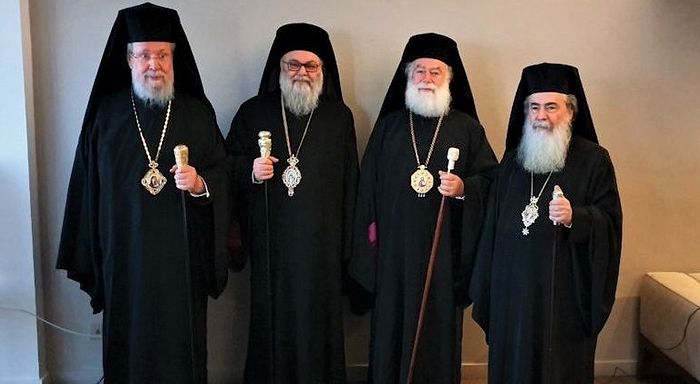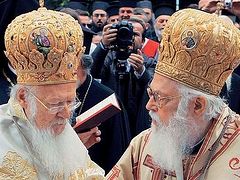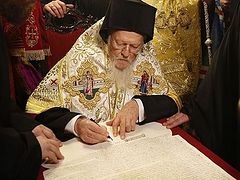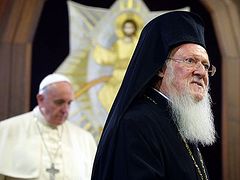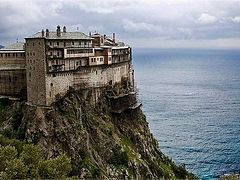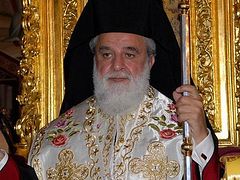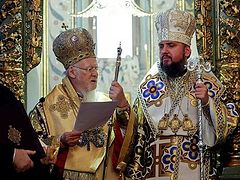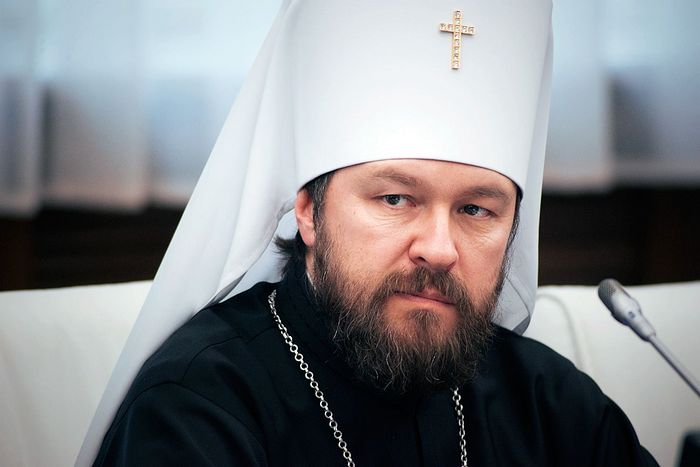 Metropolitan Hilarion (Alfeyev)
Metropolitan Hilarion (Alfeyev)
The sixth of May marked four months since Patriarch Bartholomew of Constantinople signed the “Tomos” of autocephaly of the “Orthodox church of Ukraine,” according to which Epifany Dumenko was appointed the head of this newly-established structure with the title of, “Metropolitan of Kiev and All Ukraine.” Patriarch Bartholomew sent out a letter to Primates of the Local Orthodox Churches, demanding that they recognize this structure as the canonical Orthodox Church of Ukraine instead of the Ukrainian Orthodox Church led by His Beatitude Metropolitan Onuphry of Kiev and All Ukraine.
For the past four months not a single Local Orthodox Church has recognized the act committed by Patriarch Bartholomew in flagrant violation of Church canons. A number of Churches officially expressed their disagreement with this act, as well as their non-recognition of the legalization of the schismatics, and expressed their support for the canonical Ukrainian Orthodox Church led by Metropolitan Onuphry. Other Churches took time to examine the situation. None of them has supported the lawlessness. Why?
Firstly, everyone knows that the Ukrainian Orthodox Church unites the majority of the Orthodox believers in Ukraine, having almost thirteen thousand parishes, over 200 monasteries and millions of members. The Ukrainian Orthodox Church, and not the group of schismatics which have now received legitimization from Patriarch Bartholomew, is the only canonical Church of Ukraine, as Patriarch Bartholomew has publicly stated himself more than once, the last time being in January of 2016, at the Synaxis of Primates of the Local Churches.
Secondly, it is the Ukrainian Orthodox Church led by His Beatitude Metropolitan Onuphry that is the national Orthodox Church of Ukraine. It is not a “Russian church,” as Petro Poroshenko who is stepping down from his Presidential post tried to call it. Its members are citizens of Ukraine, born and bred in their country, who have Ukrainian passports and love their homeland. Its administrative center is located not in Moscow, but in Kiev. Despite Poroshenko’s allegations, prayers in the Ukrainian Church are offered not for the Russian authorities and the Russian army, but for the Ukrainian authorities and the Ukrainian army. The self-governing Ukrainian Orthodox Church enjoys all the rights that allow it to be the national Church of its country. It is linked with the Moscow Patriarchate by spiritual and historical unity dating back to the times of the Kievan Rus’. It has neither administrative, nor financial, nor any other dependence on Moscow.
Thirdly, it is common knowledge that the schismatic community legalized by Patriarch Bartholomew is made up of two groups, one of which had no canonical hierarchy when recognized by Constantinople. One group, the so-called “Kiev Patriarchate”, is led by a man whose excommunication was recognized by all the Local Churches, including Constantinople. The other group is traced to a bishop of the Russian Church, suspended from serving, and a man who not only never had an episcopal consecration, but even ordination into the priesthood. In common terms such people are called “self-ordained.” This false hierarchy was recognized without a proper study into its origin and even without formal re-consecration, but by Patriarch Bartholomew’s volition alone.
Fourthly, even after receiving the “Tomos” the schismatic community continues to demonstrate absolute canonical lawlessness, trampling upon all Church rules. This community, which calls itself the “Orthodox church of Ukraine,” has two heads with almost identical titles. One calls himself “Metropolitan of Kiev and All Ukraine,” while the other, “Patriarch of Kiev and All Rus’-Ukraine.” The first one exists for external use, while the second one for internal use. It is the second one, not the first one, who governs the “Kiev Metropolia.” Here is what he has recently said: “The OCU is officially recognized by the Ecumenical Patriarch. Yet, in Ukraine there is the Kiev Patriarchate, because we are not satisfied with a status of metropolia. We have existed as a patriarchate for over 25 years. And people chose the patriarchs. I am the third patriarch. Before me there was Patriarch Vladimir, and Patriarch Mstislav. There were patriarchs! Therefore, for Ukraine we are a patriarchate. And for the outside world, that is for the Orthodox world, we are the Kiev Metropolia.” Can any of the Local Orthodox Churches recognize such a two-headed hydra?
Fifthly, the schism demonstrates its complete spiritual and canonical failure. Provisions of the “Tomos” are subjected to ambiguous interpretation and not carried out in practice. For instance, the “Tomos” stipulates that the “Orthodox church of Ukraine” cannot include parishes outside Ukraine. However, from a point of view of false patriarch Philaret Denisenko such parishes can remain within the so-called “Kiev Patriarchate.” “We cannot make them leave and we cannot reject them,” he said, “Since they do not want to leave us, we consider them ours.” The two-headed hydra cannot but have double-entry bookkeeping. For an internal user there is still the “Kiev Patriarchate” with a network of “parishes” abroad, and for an external user there is the “Kiev Metropolia” without them.
Sixthly, with the involvement of the authorities who shamefully lost the elections, a campaign was initiated, which has not been stopped, of supporters of the schism seizing church buildings belonging to the canonical Ukrainian Orthodox Church. These seizures are carried out using force—masked men break into a church, beat up the faithful, drive them and a priest out of the building, and proclaim themselves the lawful owners. How should world Orthodoxy react to such lawlessness? Just as it has already reacted in the persons of Patriarchs Theodore of Alexandria, John of Antioch and Theophilos of Jerusalem, who assembled in Cyprus and along with Archbishop Chrysostomos of Cyprus “called upon all people concerned to work on the one hand, to achieve Eucharistic unity, which constitutes the fullness of the Church in Christ Jesus, and on the other hand, to protect the faithful, their churches and their monasteries against all forms of transgressions and all acts of violence coming from any side, whatever the causes and motives are.”
Taking the unprecedented decision to legalize the Ukrainian schism, Patriarch Bartholomew expected that hierarchs of the canonical Church would join the structure created by him and that this structure would be recognized by the Local Orthodox Churches. Neither one thing nor the other happened; his “blitzkrieg” failed. Instead of healing the schism, Patriarch Bartholomew only deepened it, causing the rightful rejection of his actions in world Orthodoxy. And if earlier, as “the first among equals,” he could play a coordinating and consolidating role in the family of the Local Orthodox Churches, now, having declared himself “the first without equals,” he has liquidated himself as a coordinating center.
Therefore, it is quite natural that the Primates of the Local Orthodox Churches begin to seek other formats of interaction. The first sign was a meeting of the four Primates in Cyprus. The communiqué adopted at the outcome of the meeting reads: “His Beatitude Chrysostomos, Archbishop of Cyprus, briefed them [the three other Primates] on his personal initiative of mediation. After listening to His Beatitude, the Primates of the three Churches gave their support for his initiative to bear it for the good of the unity of the Orthodox Church in Christ Jesus.”
What does it mean? It means that in the absence of a coordinating center in the person of “the first among equals” the Orthodox Churches will try to create another center of interaction. When the first in the diptych has in fact withdrawn and isolated himself, the second, the third, the fourth and the tenth can become a coordinator of the pan-Orthodox efforts aimed at overcoming schisms and disorders—anyone to whom the Local Orthodox Churches can entrust this mission because he has the necessary wisdom and humility and does not lay claims to primacy and supremacy.
When in the fifth century Patriarch Nestorius of Constantinople fell into heresy, Patriarch Cyril of Alexandria played a leading part in condemning this heresy at the Third Ecumenical Council. And when in the fifteenth century the Patriarch of Constantinople supported the Unia with Rome, other Eastern Patriarchs did not recognize that act. Now, when Patriarch Bartholomew of Constantinople has found himself on the side of the schism, world Orthodoxy has not been beheaded. The Head of the Universal Church has never been the Patriarch of Constantinople. It has always been and is the Lord Jesus Christ Himself. And while within the Catholic tradition a concept developed about the Pope as the Vicar of Christ, His earthly representative, the Orthodox tradition has never known such concept.
“As man is subject to death and cannot be the permanent head of the Church, our Lord Jesus Christ Himself, as the Head holding the helm of governance of the Church, governs it through the Holy Fathers.” Under these words the four Eastern Patriarchs—of Constantinople, Alexandria, Antioch and Jerusalem—placed their signatures in 1723. And in 1895, in reply to Pope Leo XIII’s appeal the Synod of the Church of Constantinople was stated: “Relying on the Fathers and Ecumenical Councils of the Church of the first nine centuries we ascertain that the bishop of Rome was never regarded as the supreme leader and infallible head of the Church and that any bishop is the head and primate of his particular church, subject only to conciliar resolutions and decisions of the catholic Church as the only infallible decisions, and that the bishop of Rome was in no way, as the church history shows, an exception from this rule. The only eternal Chief Leader and immortal Head of the Church is our Lord Jesus Christ.”
The current Patriarch of Constantinople has, in fact, repudiated the pan-Orthodox teaching, unambiguously expressed in these texts, and considered himself the only infallible head of the Orthodox Church who has the right to accept appeals from any of the Local Churches, to interfere in their life, and to administer and arrange their affairs at his own discretion and self-will. However, a sad experience of his oportunistic interference in the Ukrainian situation has showed that while fully respecting the existing institutions stemming from the primacy of honor in accordance with the diptychs, the Plenitude of world Orthodoxy rejects such excess of powers by the Patriarch of Constantinople, just as in the past it consistently rejected attempts by any hierarchs to appropriate prerogatives that did not belong to them.
A schism is still a schism, and Orthodoxy only gets stronger through the ordeals it suffers, as is demonstrated by the Ukrainian Orthodox Church—which is today following the path of martyrdom, calmly and courageously responding to the external and internal challenges. In its heroic defense of the truth it enjoys the strong support of the Local Orthodox Churches, and it is such consolidated support that will ultimately help heal the Ukrainian schism.

